Der FC St. Pauli gewinnt gegen Eintracht Braunschweig so dermaßen überzeugend, dass ich am Ende dieses Textes einen Abschnitt eingebaut habe, der darüber nörgelt, dass das Spiel nur 2:0 endete. Bereits nach weniger als 15 Minuten war das Spiel entschieden, auf dem Platz war ein erheblicher Klassenunterschied spürbar.
(Titelbild: imago images/via OneFootball)
Die Aufstellung
Der FC St. Pauli musste in der Defensive neben dem schon länger bekannten Ausfall von Rechtsverteidiger Sebastian Ohlsson auch noch kurzfristig auf den erkrankten James Lawrence verzichten. Und da der etatmäßige Ersatzmann von Lawrence, Tore Reginiussen, ebenfalls erkrankt ausfiel, fand sich Adam Dźwigała in der Startelf wieder (und in der zweiten Halbzeit fand sich erfreulicherweise noch jemand anderes dort wieder).
Diese Wechsel in der Defensive hätten vor ein paar Wochen Schweißperlen auf meiner Stirn produziert. Inzwischen ist das nicht mehr der Fall. Zu stabil hat der FCSP zuletzt auch defensiv gespielt. Und an der Formation mit der Mittelfeldraute änderte sich nichts.
Auf der Gegenseite gab es gleich eine ganze Reihe von Wechseln. Mit Wiebe, Behrendt, Nikolaou, Ji und Kaufmann fielen aus verschiedenen Gründen gleich fünf Spieler aus, die zuletzt gegen Darmstadt zur Startelf gehörten. Vermutlich auch dadurch war Eintracht Braunschweig gezwungen die Formation leicht umzustellen: Das zuletzt erfolgreich gespielte 4-2-3-1 wich einem 3-5-2 bei dem Felix Kroos etwas überraschend nicht nach hinten in die defensive Mittelfeldzentrale rückte, sondern als hängende Spitze agierte. Eine andere mögliche Erklärung ist, dass Eintracht Braunschweig versuchte das Mittelfeld des FCSP besser aufzunehmen, was mit dem 3-5-2 zumindest auf dem Papier etwas besser möglich ist, da Wydra, Kammerbauer und Ben Balla zentral Zalazar, Kyereh und Becker hätten aufnehmen können. Ihr merkt, ich gehe in den Konjunktiv, denn der Auftritt von Eintracht Braunschweig war schon ziemlich ernüchternd. Wie Thomas Stickroth, Aushilfscoach der Gäste und bekanntlich früher auch mal bei uns im Funktionsteam, nach dem Spiel auf der Pressekonferenz aber mitteilte, war es tatsächlich der Plan, „im Mittelfeld die Raute 1:1 zu deckeln“ – er sagt aber auch gleich im nächsten Satz, dass ihnen dies „nicht gut gelungen“ ist. So kann man das auch formulieren.
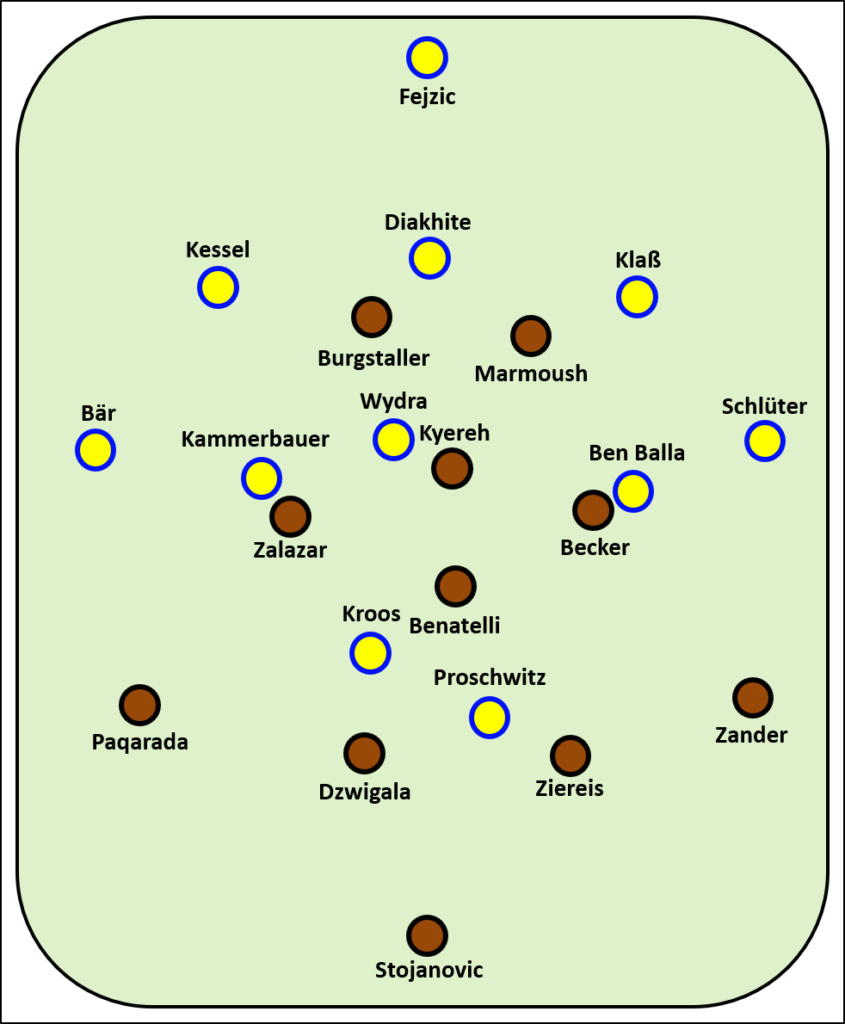
Dem FCSP Raum geben – Eine blöde Idee
Denn was nützt es, dass ein 3-5-2 im tiefen Pressing die Formation des FCSP gut aufnimmt, wenn der eigentlich viel gefährlicheren Spielweise des FCSP nicht ansatzweise etwas entgegengestellt wird? Im Vorbericht bei BlauGelbe-Datenwelt hatte ich das Spiel des FCSP ein wenig genauer beschrieben. Ein Auszug: „Das Angriffsspiel des FC St. Pauli zeichnet sich vor allem durch enormes Tempo aus. Als wäre das nicht genug sind vor allem Spieler wie Marmoush, Kyereh und Zalazar immer wieder mit tiefen Dribblings erfolgreich.“ – Ich hatte nicht damit gerechnet, dass diese Beschreibung so dermaßen gut auf die erste Halbzeit des FC St. Pauli passen würde. Eintracht Braunschweig schien auf diese Stärke des FCSP überhaupt nicht vorbereitet und ließ bereits kurz nach Spielbeginn unglaubliche Lücken in defensiven Umschaltmomenten erkennen und war dem starken Gegenpressing des FCSP teilweise hilflos ausgeliefert. Das war schon bemerkenswert, da Braunschweig in den letzten fünf Spielen nur ein einziges Gegentor hinnehmen musste und besonders die Defensive eines der wichtigsten Elemente für einen erfolgreichen Abstiegskampf zu werden schien. Auf das enorm starke Umschaltspiel des FC St. Pauli war Eintracht Braunschweig in Sachen Rückverteidigung jedoch nur unzureichend vorbereitet.
Stattdessen saß ich um 20.38 vor dem Rechner und rief: „Marmoush! Tempo!“ – Ja, wenn der FCSP erst einmal Tempo aufgenommen hat, dann ist er ganz schwer zu verteidigen. Gerade Omar Marmoush sollte da von jedem gegnerischen Analysten mit „keinen Raum für tiefe Dribblings geben“ markiert worden sein. In der siebten Minute bekam Marmoush diesen Raum. Es folgte ein-, zwei-, dreimal „Tanze Samba mit mir“ mit Gegenspieler Klaß und dann ab die Kirsche. Wenn er damit seine Gegenspieler so auswackeln kann, dann hätte ich auch gerne die Hüftprobleme, die Marmoush unter der Woche nach Auskunft von Timo Schultz hatte.
Eintracht Braunschweig hatte in den ersten 20 Minuten keinen, wirklich überhaupt keinen Zugriff auf die Spieler des FC St. Pauli in Umschaltmomenten. Sie schienen ob der vielen personellen Wechsel und auch aufgrund des System-Wechsels schlicht überfordert mit dem FCSP. Es war mehr als ein Klassenunterschied.
Auf der anderen Seite sprudelte die Spielfreude nur so heraus. Besonders die Agilität von Rico Benatelli in diesen ersten Minuten war beeindruckend. Laut sofascore hat Rico Benatelli satte 76 Pässe an den Mitspieler gebracht, was einer Quote von über 90% entspricht. Und im Gegensatz zu vielen anderen Auftritten waren es nicht meist nur Quer- oder Rückpässe, nein, Benatelli hat das Aufbauspiel trotz engem Raum sehr häufig nach vorne getrieben.
Und es war dann wieder ein Umschaltmoment, den der FC St. Pauli in der 14. Minute zum zweiten Tor nutzte. Und wieder muss sich Eintracht Braunschweig fragen, wie so eine offene Stellung gegen den FC St. Pauli passieren kann. Das darf einfach nicht sein. Aber ich möchte hier gar nicht die Leistung des FCSP schlechtreden. Denn die Ballgewinne und das schnelle Umschalten, aber auch die Passsicherheit waren richtig, richtig gut, das 2-0 durch Daniel-Kofi Kyereh nach einer Viertelstunde hochverdient.
Während Eintracht Braunschweig erst durch ein grenzwertig hartes Einsteigen von Kroos gegen Benatelli auffällig wurde, hatte Omar Marmoush bereits auch schon einen Kopfball aus nächster Nähe an den Pfosten gesetzt. Kroos holte sich eine Gelbe Karte ab, die ich mit dem Attribut „mindestens“ versehe.
In der Folge beruhigte sich das Spiel merklich. Mit der Führung im Rücken konnte der FCSP noch mehr den Fokus auf Umschaltmomente legen, während Eintracht Braunschweig eindrucksvoll zeigte, das sie mit 23 Toren die bisher schwächste Offensive der Liga stellen.
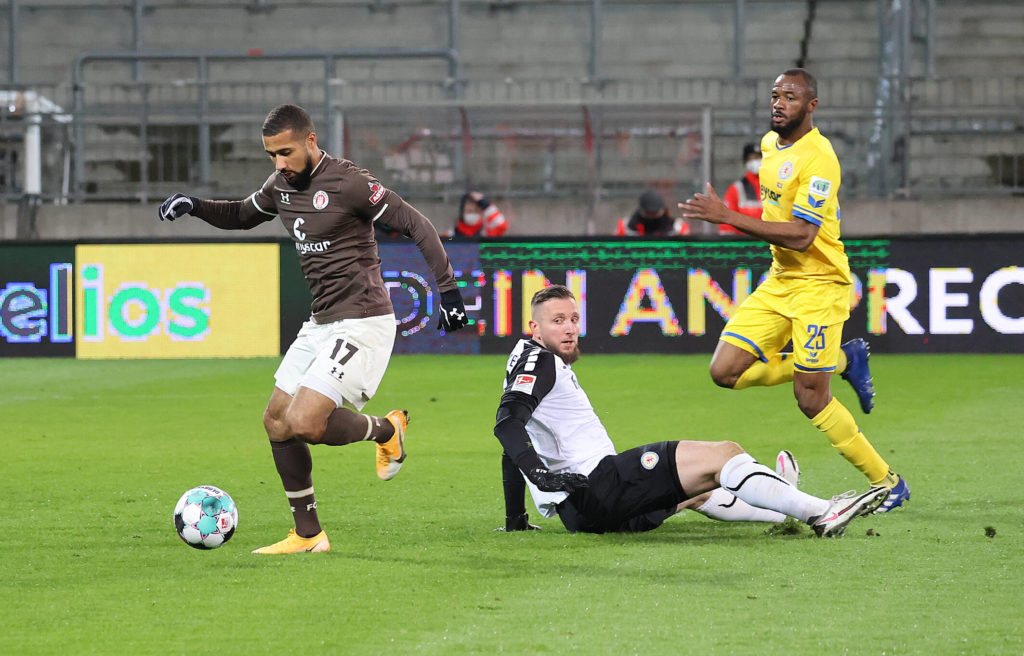
(imago images/via OneFootball)
Nur fünf Torschüsse in der ersten Halbzeit – Trotzdem eine überzeugende Vorstellung
Schon bemerkenswert: Der FC St. Pauli hat nach 45 Minuten nur fünf Torschüsse abgefeuert. Das ist eigentlich eine ziemlich schwache Bilanz. Aber Eintracht Braunschweig darf sich glücklich schätzen., dass sie nicht mit vier oder sogar fünf Gegentoren in die Pause gehen. Denn alle Torschüsse waren glasklare Torchancen. Nach den beiden Toren setzte Marmoush den bereits erwähnten Kopfball an den Pfosten, Burgstaller traf nach toller Kombination mit Kyereh das leere Tor nicht und Benatelli zeigte einmal mehr, dass freistehende Einschussgelegenheiten im Rückraum (noch) nicht sein Spezialgebiet sind. Sei es drum, wir reden hier von einer verdienten 2:0-Führung zur Halbzeit.
Auch aus der Halbzeit kommt der FCSP besser raus als Braunschweig: Zalazar, Burgstaller und Marmoush hätten bereits in den ersten zehn Minuten für die Vorentscheidung sorgen können.
Das Braunschweig nicht einmal mehr selbst an einen Punktgewinn glaubte, zeigte sich spätestens in der 65.Minute mit der Auswechslung von Abwehrchef Oumar Diakhite, um ihn vor der fünften gelben Karte zu schützen (am nächsten Spieltag kommt das enorm wichtige Spiel gegen Osnabrück).
Im Verlauf der zweiten Halbzeit zeigte sich dann auch, dass es nicht nur die Umschaltmomente waren, mit denen der FCSP gute Offensiv-Aktionen kreierte. Der FCSP spielte verhältnismäßig häufig diagonale Seitenverlagerungen, um die Dreierkette von Braunschweig maximal horizontal zu belasten. Und da Braunschweig in einem 3-5-2 presste und sich nicht dauerhaft defensiv zu einer Fünferkette hinten formierte, waren diese Räume durchaus vorhanden und die Seitenverlagerungen sorgten häufig für Gefahr. Zusätzlich zeigte sich der FCSP etwas variabler im Mittelfeld: Rodrigo Zalazar tauschte in der ersten Halbzeit die Position mit Finn Ole Becker. Kyereh war viel häufiger als zuletzt auf der linken Seite zu finden und wenn ich penibel wäre, dann würde ich die Offensiv-Formation des FCSP dadurch sogar eher als 4-3-3 bezeichnen, mit Marmoush und Kyereh als Außenstürmer. Auch im Aufbau waren leichte Änderungen bemerkbar: Rico Benatelli wurde sehr viel mehr in das Spiel eingebunden (oder um es aktiv auszudrücken: Er verstand seine Rolle sehr viel mehr als deep playmaker als in den Spielen zuvor). Er ließ sich häufig vor die gegnerischen Stürmer fallen und holte sich tief die Bälle ab (evtl. auch der Abwesenheit von Lawrence geschuldet). Teilweise boten sich auch Becker und Zalazar tief in den Halbräumen der eigenen Hälfte an und konnten so auch zentral eine Überzahl erzeugen, da Benatelli dadurch vorrücken konnte und anspielbar war. Die tiefe Ordnung von Braunschweig und der mannorientierte Fokus von Ben Balla und Kammerbauer öffneten hierbei den Raum für ihn. Somit hat der FCSP sein Aufbauspiel um eine Facette erweitert (kann auch sein, dass diese Eröffnung in den Spielen vorher auch schon versucht wurde, aber mir ist sie gestern zum ersten Mal aufgefallen). Gut für uns, schlecht für die kommenden Gegner.
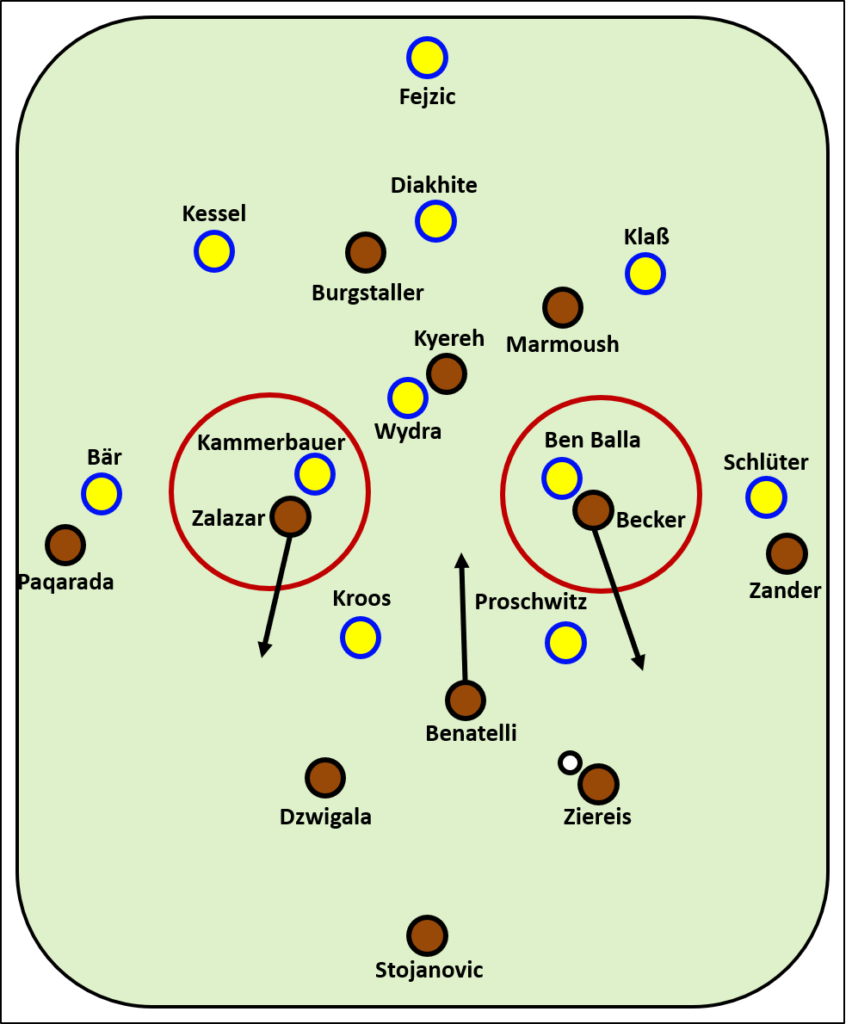
Es war schon richtig gut, wie ballsicher sich der FCSP zeigte. Im gesamten Spielverlauf ließen wir keine einzige längere Druckphase von Braunschweig zu, konnten uns dem Zugriff der Braunschweiger immer gut entziehen und hatten diesen selbst eigentlich immer. Das war schon richtig überzeugend und ich muss zugeben, dass ich nach dem Spiel gegen Osnabrück schon begeistert etwas zur Dominanz des FCSP schrieb. Gegen Braunschweig wurde aber noch eine Schippe draufgelegt. In diesen beiden Spielen dominierte der FC St. Pauli wie lange, lange Zeit nicht mehr und zeigte, dass es in der 2.Liga, eigentlich für ihre Ausgeglichenheit berühmt, erhebliche Klassenunterschiede gibt. Das ist äußerst ungewohnt aus FCSP-Sicht, aber umso großartiger finde ich es.
Für die letzten 20 Minuten wechselte der FCSP dann positionsgetreu Lukas Daschner für den gelb-vorbelasteten Kyereh und Maximilian Dittgen als zweite Spitze neben Burgstaller ein. Zu diesem Zeitpunkt war Marvin Knoll bereits zehn Minuten auf dem Spielfeld. Er ersetzte Adam Dźwigała nach rund einer Stunde in der Innenverteidigung.
Daschner hatte bereits Sekunden nach seiner Einwechslung das dritte Tor auf dem Fuß, scheiterte aber an Fejzic. Kurz darauf verlor Ziereis den Ball in der Vorwärtsbewegung und ermöglichte so die bis dahin größte Chance für Braunschweig. Und schon fing mein Kopfkino an.
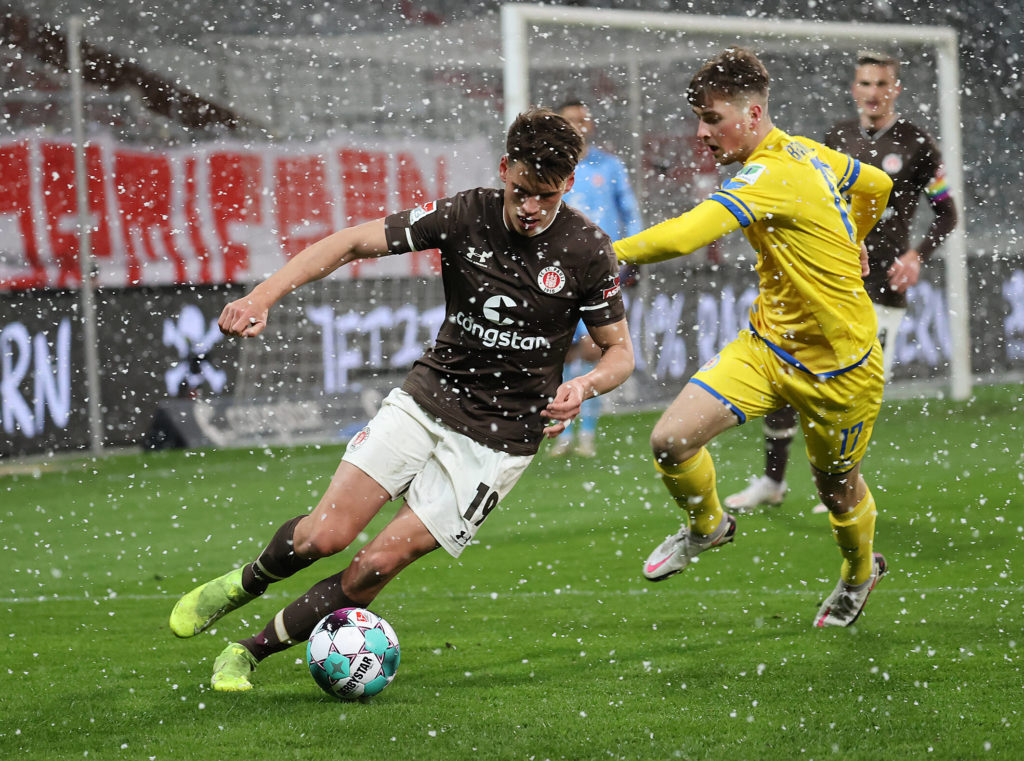
(imago images/via OneFootball)
Einmal das 3-0 machen!
Zugegeben: Es ist meckern auf sehr hohem Niveau. Aber der FC St. Pauli kann auf solche Spiele, in denen er haushoch überlegen ist, gerne mal frühzeitig den Deckel draufmachen und das dritte Tor erzielen. Zum siebten Mal in den letzten zwölf Spielen führte der FCSP Mitte der zweiten Halbzeit mit 2-0, war teils hoch überlegen. Alle diese Spiele wurden gewonnen, daher gibt es eigentlich auch keinen Grund zum Nörgeln. ABER… in fünf dieser sieben Spiel erzielte der Gegner mindestens noch den Anschlusstreffer (Darmstadt und Hannover glichen sogar noch aus) und es war Zittern angesagt.
Und auch gegen Braunschweig war es durch „nur“ Zwei-Tore-Führung ein Spiel, das jederzeit hätte kippen können, wenn der Gegner einen Ball irgendwie reinschlingert. Das wäre gerade aus Braunschweiger Sicht zwar absolut glücklich und unverdient gewesen, aber es waren durchaus Situationen da, in denen sie den Anschlusstreffer hätten erzielen können, während der FCSP auf der Gegenseite einige Chancen liegengelassen hat (xG laut fivethirthyeight bei 3.3 zu 0.7, womit der FCSP die Tabellenführung als beste Offensive der Liga nach xG verteidigt haben dürfte).
Die Ansicht deckt sich auch mit der von Timo Schultz, der nach dem Spiel sagte: „Wenn ich hier sitze und mich über den Spielverlauf beim 2:0-Sieg ärgere, dann sieht man, dass wir auf dem richtigen Weg sind.“
Egal. Das sind echte Luxus-Probleme von denen ich hier schreibe. Der FC St. Pauli gewinnt in überzeugender Manier gegen ein schwaches Eintracht Braunschweig. Besonders beim Vergleich mit dem Hinspiel fällt auf, wie enorm breit die Brust des FCSP inzwischen ist, wie unglaublich gut sich dieses Team inzwischen entwickelt hat, wie stabil es ist und seinen Stiefel runterspielen kann. Das ist einfach großartig, wenn ich bedenke wie ich vor Wochen auf die letzten beiden Spieltage gegen Osnabrück und Braunschweig geschaut habe und dies für enorm wichtige Spiele im Kampf um den Klassenerhalt hielt. Das der FCSP nach diesen beiden Spielen mit nun 38 Punkten auf dem Konto und zwölf Punkten Vorsprung auf den Relegationsplatz den Klassenerhalt nahezu sicher hat, damit hatte ich nicht gerechnet. Jetzt noch bei solchen Spielen im Stadion sein, es wäre nahe an der Perfektion!
// Tim
Alle Beiträge beim MillernTon sind gratis. Wir freuen uns aber sehr, wenn Du uns unterstützt.
MillernTon auf BlueSky // Mastodon // Facebook // Instagram // Threads // WhatsApp // YouTube
{:}{:en}FC St. Pauli wins against Eintracht Braunschweig so convincingly that I have included a paragraph at the end of this text nagging about the fact that the game only ended 2-0. The game was already decided after less than 15 minutes, and a considerable class difference was noticeable on the pitch.
(Cover photo: imago images/via OneFootball)
The lineup
FC St. Pauli had to make do without right-back Sebastian Ohlsson, who had been absent for some time, as well as James Lawrence, who had fallen ill. And since Lawrence’s regular replacement, Tore Reginiussen, was also out with illness, Adam Dźwigała found himself in the starting eleven (and fortunately someone else found himself there in the second half).
These defensive changes would have produced beads of sweat on my forehead a few weeks ago. Nowadays, that is no longer the case. FCSP has been too stable defensively of late. And nothing has changed in the formation with the midfield diamond.
On the other side, there was a whole series of changes. With Wiebe, Behrendt, Nikolaou, Ji and Kaufmann, five players who were in the starting eleven against Darmstadt were absent for various reasons. Probably because of this, Eintracht Braunschweig was forced to change the formation slightly: The 4-2-3-1 that had been played successfully recently gave way to a 3-5-2 in which Felix Kroos, somewhat surprisingly, did not move to the defensive midfield center back, but instead acted as a hanging point. Another possible explanation is that Eintracht Braunschweig tried to better absorb FCSP’s midfield, which is somewhat more possible with the 3-5-2, at least on paper, since Wydra, Kammerbauer, and Ben Balla could have taken on Zalazar, Kyereh, and Becker centrally. You notice I’m going into the subjunctive, because Eintracht Braunschweig’s performance was already pretty sobering. However, as Thomas Stickroth, the visitors‘ stand-in coach and, as you know, also a former member of our functional team, told the press conference after the game, the plan was indeed „to cover the diamond 1:1 in midfield“ – but he also says in the very next sentence that they „didn’t succeed very well“. That’s one way to put it.

Giving FCSP space – A bad idea
After all, what good is it that a 3-5-2 in deep pressing takes FCSP’s formation well if FCSP’s actually much more dangerous style of play is not countered to any degree? In the preliminary report at BlauGelbe-Datenwelt I had described the game of FCSP a little more detailed. An excerpt: „The attacking game of FC St. Pauli is characterized above all by enormous speed. As if that weren’t enough, players like Marmoush, Kyereh and Zalazar in particular are always successful with deep dribbles.“ – I didn’t expect that description to fit FC St. Pauli’s first half so well. Eintracht Braunschweig didn’t seem prepared at all for this strength of FCSP and showed incredible gaps in defensive switching moments shortly after the start of the game and was at the mercy of FCSP’s strong counterpressing at times. This was quite remarkable, as Braunschweig had conceded only one goal in the last five games and especially the defense seemed to become one of the most important elements for a successful relegation fight. However, Eintracht Braunschweig was inadequately prepared for FC St. Pauli’s enormously strong transition game in terms of defending at the back.
Instead, I sat in front of the computer at 20:38 and shouted, „Marmoush! Tempo!“ – Yes, once FCSP picks up speed, it is quite difficult to defend. Omar Marmoush, in particular, should have been tagged there by every opposing analyst as “ don’t give room for deep dribbles“. In the seventh minute, Marmoush got that space. There followed one, two, three times „dance samba with me“ with counterpart Klaß and then off the cherry (translator’s note: I belive that means „take a shot on goal“). If he can wiggle out his opponents like that, then I would also like to have the hip problems that Marmoush had during the week according to Timo Schultz.
Eintracht Braunschweig had no, really no access at all to the players of FC St. Pauli in the first 20 minutes. Due to the many personnel changes and the change of system, they seemed simply overwhelmed by FCSP. It was more than a difference in league.
On the other hand, the joy of playing just bubbled out. Especially the agility of Rico Benatelli in those first minutes was impressive. According to sofascore, Rico Benatelli delivered a whopping 76 passes to his teammates, which corresponds to a rate of over 90%. And in contrast to many other performances, it wasn’t mostly just crosses or back passes, no, Benatelli pushed the build-up play forward very often despite the tight space.
And it was then another turnover moment that FC St. Pauli took advantage of in the 14th minute to score their second goal. And again Eintracht Braunschweig has to ask itself how such an open position can happen against FC St. Pauli. That simply can’t be allowed to happen. But I don’t want to badmouth FCSP’s performance here at all. Because the ball wins and the fast switching, but also the pass security were really, really good. The 2-0 by Daniel-Kofi Kyereh after a quarter of an hour was highly deserved.
While Eintracht Braunschweig only became noticeable due to a borderline harsh intervention by Kroos against Benatelli, Omar Marmoush had already put a header against the post from close range. Kroos picked up a yellow card, which I give the attribute „at least“.
As a result, the game calmed down noticeably. With the lead behind them, FCSP was able to focus even more on switching moments, while Eintracht Braunschweig impressively showed that, with 23 goals, they have the weakest offense in the league so far.

(imago images/via OneFootball)
Only five shots on goal in the first half – Still a convincing performance
Quite remarkable: FC St. Pauli only fired five shots on goal after 45 minutes. That’s actually a pretty weak showing. But Eintracht Braunschweig can consider themselves lucky not to go into the break with four or even five goals conceded. Because all of the shots on goal were crystal-clear scoring opportunities. After the two goals, Marmoush hit the aforementioned header against the post, Burgstaller failed to hit the empty net after a great combination with Kyereh, and Benatelli showed once again that free-standing scoring opportunities in the back are not (yet) his specialty. Be that as it may, we’re talking about a deserved 2-0 lead at halftime.
FCSP also comes out of the break better than Braunschweig: Zalazar, Burgstaller and Marmoush could have already provided the preliminary decision in the first ten minutes.
That Braunschweig no longer even believed in winning a point itself was evident at the latest in the 65th minute with the substitution of head of defense Oumar Diakhite to protect him from the fifth yellow card (next matchday comes the enormously important match against Osnabrück).
As the second half progressed, it became apparent that it wasn’t just the turnover moments that FCSP used to create good offensive action. FCSP played diagonal sideshifts relatively often in order to put maximum horizontal pressure on Braunschweig’s three-man defense. And since Braunschweig pressed in a 3-5-2 and did not permanently form a back five defensively, these spaces were definitely there and the lateral shifts often created danger. In addition, FCSP showed some more variability in midfield, with Rodrigo Zalazar swapping positions with Finn Ole Becker in the first half. Kyereh was to be found on the left side much more often than recently and if I were meticulous, I would even describe FCSP’s offensive formation as more of a 4-3-3 as a result, with Marmoush and Kyereh as wingers. Slight changes were also noticeable in the build-up: Rico Benatelli was much more involved in the game (or to put it actively: he understood his role much more as a deep playmaker than in the games before). He often dropped in front of the opposing forwards and picked up the balls deep (possibly also due to the absence of Lawrence). At times, Becker and Zalazar also offered themselves deep in the half-areas of their own half and were thus also able to create an advantage centrally, as Benatelli was thus able to advance and was addressable. Braunschweig’s deep order and the man-oriented focus of Ben Balla and Kammerbauer opened up space for him in this regard. Thus, FCSP added a facet to their build-up play (may also be that this opening was tried in the games before, but I noticed it for the first time yesterday). Good for us, bad for the upcoming opponents.

It was really good how confident FCSP was on the ball. Throughout the game, we didn’t allow Braunschweig a single prolonged period of pressure, were always able to escape Braunschweig’s grip well and actually always had it ourselves. That was really convincing and I have to admit that after the game against Osnabrück I wrote something enthusiastic about the dominance of FCSP. Against Braunschweig, however, they stepped it up a notch. In these two games, FC St. Pauli dominated like it hasn’t for a long, long time and showed that there are considerable gaps in class in the 2.Liga, which is actually famous for its balance. This is extremely unusual from FCSP’s point of view, but I find it all the more awesome.
For the final 20 minutes, FCSP substituted Lukas Daschner for the yellow-carded Kyereh and Maximilian Dittgen as the second top player next to Burgstaller. At this point, Marvin Knoll had already been on the pitch for ten minutes. He replaced Adam Dźwigała in central defense after around an hour.
Daschner had the third goal on his foot seconds after his substitution, but failed to beat Fejzic. Shortly after, Ziereis lost the ball in the forward movement and thus allowed Braunschweig’s biggest chance up to that point. And then my head started spinning.

(imago images/via OneFootball)
Make it 3-0 for once!
Admittedly: It’s complaining at a very high level. But FC St. Pauli could easily put the lid on such games, in which they are vastly superior, early on and score the third goal. For the seventh time in the last twelve games, FCSP led 2-0 midway through the second half and was highly superior at times. All of these games were won, so there is really no reason to nag. BUT… in five of these seven games, the opponent scored at least the final goal (Darmstadt and Hannover even equalized) and it was a nail-biter.
And against Braunschweig, too, the „only“ two-goal lead made it a game that could have tipped over at any time if the opponent somehow slipped a ball in. That would have been absolutely lucky and undeserved, especially from Braunschweig’s point of view, but there were definitely situations where they could have scored the tying goal, while FCSP left some chances on the other side (xG according to fivethirthyeight at 3.3 to 0.7, which should have defended FCSP’s lead as the league’s best offense according to xG).
The view also coincides with that of Timo Schultz, who said after the game, „When I sit here and get angry about the way the game went in the 2-0 win, you can see we’re on the right track.“
No matter. These are real luxury problems I’m writing about here. FC St. Pauli wins in convincing fashion against a weak Eintracht Braunschweig. Especially when you compare it to the first leg, you notice how enormously broad FCSP’s chest is by now, how incredibly well this team has developed in the meantime, how stable it is and how it can play its game down. That’s just great when I think about how I looked at the last two matchdays against Osnabrück and Braunschweig weeks ago and thought these were enormously important games in the fight to stay in the class. That the FCSP after these two games with now 38 points on the account and twelve points ahead of the relegation place the class preservation has almost sure, I had not expected. Now to be in the stadium for games like this, it would be close to perfection!
// Tim
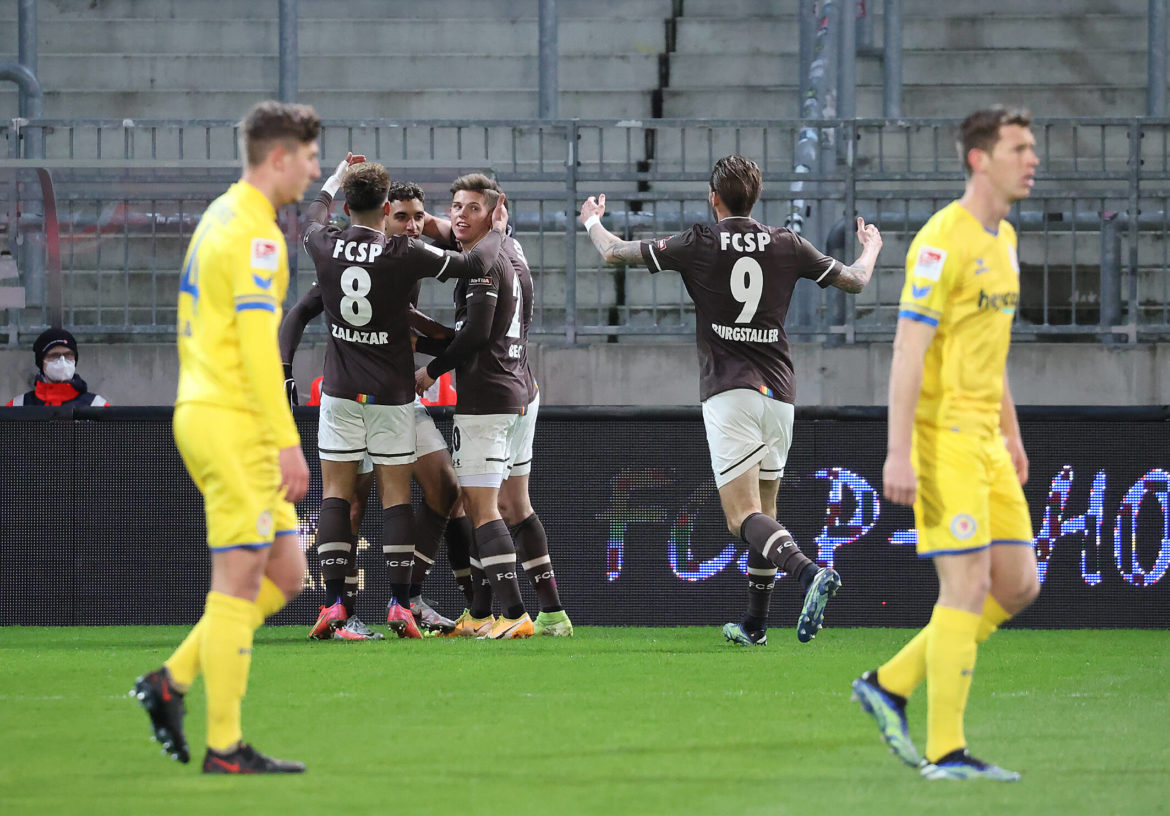

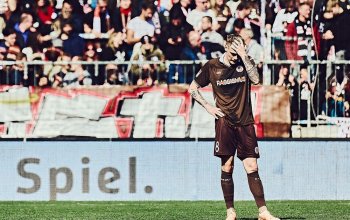
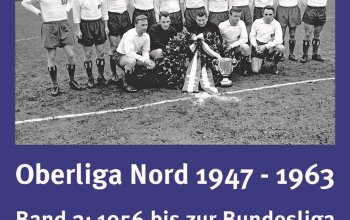

Danke. Mal weider sehr lesenswert.
Danke Remmy!
Einfach mal glücklich sein ?
Sehr gerne! 😉
Moin Tim,
danke dir. Mit Grusel erinnere ich den Nachbericht vom 10. Spieltag. –
Auswärtssieg mit W, sechs Buchstaben 😉
Wenn wir da auch noch gewinnen, dann weiß ich auch nicht mehr weiter 🙂
Heidenheim Syndrom.